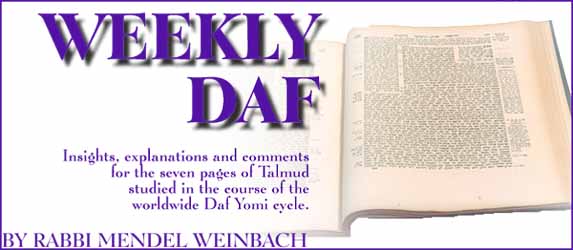Weekly Daf #94
Avodah Zarah 44-50 -- Issue #94
29 Cheshvan-5 Kislev 5756 / 22-28 November 1995
Rav Weinbach's insights, explanations and comments for the
7 pages of Talmud studied in the course of the worldwide Daf Yomi cycleCan't Say "I Can't Say"
In Acco there was a bathhouse located in the courtyard of the temple of the idol Aphrodite. When Rabbi Gamliel was once bathing there he was challenged by a Roman official as to how he was able to do so when the Torah forbids deriving any benefit from idols.
Rabbi Gamliel, says the Mishnah, had three different answers to this challenge but offered no response at all while he was in the bathhouse. Only after he and the official left the bathhouse did the sage turn to him and explain that he could not respond while in the bathhouse because the stench in such a place renders it unfit for speaking sacred words of Torah. Then he proceeded to explain why his bathing there was not considered benefiting from the idol.
This incident indicates that even to say "One is forbidden
to respond to a Torah subject in a bathhouse," is itself
considered a statement of Torah, and therefore too sacred
for a place with an offensive odor.
Who Will Save the Queen?
 The story is told of an Egyptian king who presented the chief
rabbi in his country with an extremely difficult challenge. While
strolling in the royal gardens with his wife on a very hot day
the queen could not resist bathing in a cool spring despite the
fact that the king thrice forbade her to do so. The royal ministers
cited an Egyptian law that such disobedience is punishable by
death and insisted on the queen's execution. Anxious to save
his beloved queen, the king turned to the Jewish rabbi, the Moslem
mufti and the Christian archbishop, promising a reward to the
one who found a solution and threatening punishment if no solution
were found.
The story is told of an Egyptian king who presented the chief
rabbi in his country with an extremely difficult challenge. While
strolling in the royal gardens with his wife on a very hot day
the queen could not resist bathing in a cool spring despite the
fact that the king thrice forbade her to do so. The royal ministers
cited an Egyptian law that such disobedience is punishable by
death and insisted on the queen's execution. Anxious to save
his beloved queen, the king turned to the Jewish rabbi, the Moslem
mufti and the Christian archbishop, promising a reward to the
one who found a solution and threatening punishment if no solution
were found.
The rabbi anxiously turned for help to the famed Rav of Brisk, Rabbi Yehoshua Leib Diskin, who then lived in Jerusalem. He immediately sent the rabbi in Egypt a letter citing the Talmudic law that if someone bows in idolatrous worship to specific waters of a flowing spring, the waters which follow them are unaffected and benefit may be derived from them. The reason is that the waters to which he bowed have already passed and these are other waters. In similar fashion the waters which the king had forbade the queen to bathe in had already passed and she had not defied his command when she bathed in the waters which followed.
The solution was accepted by the ministers and the king sent the
Brisker Rav a gold medallion in appreciation of the brilliant
service.
General Editor: Rabbi Moshe Newman
Production Design: Lev Seltzer
HTML Design: Michael Treblow
© 1995 Ohr Somayach International - All rights reserved. This publication may be distributed to another person intact without prior permission. We also encourage you to include this material in other publications, such as synagogue newsletters. However, we ask that you contact us beforehand for permission, and then send us a sample issue.
This publication is available via E-Mail
Ohr Somayach Institutions is an international network of Yeshivot and outreach centers, with branches in North America, Europe, South Africa and South America. The Central Campus in Jerusalem provides a full range of educational services for over 685 full-time students. The Jewish Learning Exchange (JLE) of Ohr Somayach offers summer and winter programs in Israel that attract hundreds of university students from around the world for 3 to 8 weeks of study and touring.
 Copyright © 1995 Ohr Somayach International. Send us feedback.
Copyright © 1995 Ohr Somayach International. Send us feedback.Dedication opportunities are available for Weekly Daf. Please contact us for details.







